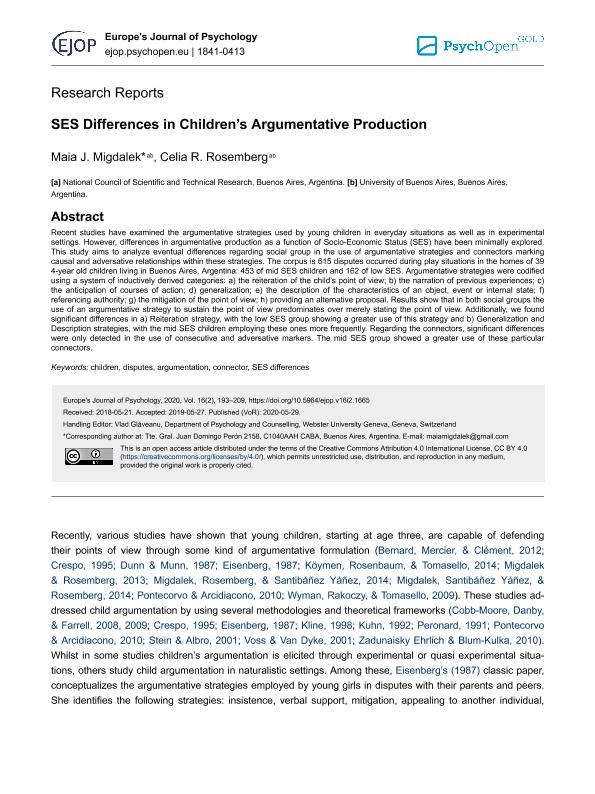Mostrar el registro sencillo del ítem
dc.contributor.author
Migdalek, Maia Julieta

dc.contributor.author
Rosemberg, Celia Renata

dc.date.available
2020-07-03T19:21:51Z
dc.date.issued
2020-05
dc.identifier.citation
Migdalek, Maia Julieta; Rosemberg, Celia Renata; SES Differences in Children’s Argumentative Production; University of Bucharest; European Journal of Psychology; 16; 2; 5-2020; 193-209
dc.identifier.uri
http://hdl.handle.net/11336/108789
dc.description.abstract
Recent studies have examined the argumentative strategies used by young children in everyday situations as well as in experimental settings. However, differences in argumentative production as a function of socio-economic status (SES) have been minimally explored. This study aims to analyze eventual differences regarding social group in the use of argumentative strategies and connectors marking causal and adversative relationships within these strategies. The corpus is 615 disputes occurred during play situations in the homes of 39 4-year old children living in Buenos Aires, Argentina: 453 of mid SES children and 162 of low SES. Argumentative strategies were codified using a system of inductively derived categories: a) the reiteration of the child?s point of view; b) the narration of previous experiences; c) the anticipation of courses of action; d) generalization; e) the description of the characteristics of an object, event or internal state; f) referencing authority; g) the mitigation of the point of view; h) providing an alternative proposal. Results show that in both social groups the use of an argumentative strategy to sustain the point of view predominates over merely stating the point of view. Additionally, we found significant differences in a) Reiteration strategy, with the low SES group showing a greater use of this strategy and b) Generalization and Description strategies, with the mid SES children employing these ones more frequently. Regarding the connectors, significant differences were only detected in the use of consecutive and adversative markers. The mid SES group showed a greater use of these particular connectors.
dc.format
application/pdf
dc.language.iso
eng
dc.publisher
University of Bucharest
dc.rights
info:eu-repo/semantics/openAccess
dc.rights.uri
https://creativecommons.org/licenses/by/2.5/ar/
dc.subject
CHILDREN
dc.subject
DISPUTES
dc.subject
ARGUMENTATION
dc.subject
CONNECTOR
dc.subject
SES DIFFERENCES
dc.subject.classification
Otras Ciencias de la Educación

dc.subject.classification
Ciencias de la Educación

dc.subject.classification
CIENCIAS SOCIALES

dc.title
SES Differences in Children’s Argumentative Production
dc.type
info:eu-repo/semantics/article
dc.type
info:ar-repo/semantics/artículo
dc.type
info:eu-repo/semantics/publishedVersion
dc.date.updated
2020-06-23T15:10:51Z
dc.identifier.eissn
1841-0413
dc.journal.volume
16
dc.journal.number
2
dc.journal.pagination
193-209
dc.journal.pais
Rumania

dc.description.fil
Fil: Migdalek, Maia Julieta. Consejo Nacional de Investigaciones Científicas y Técnicas. Oficina de Coordinación Administrativa Saavedra 15. Centro Interdisciplinario de Investigaciones en Psicología Matemática y Experimental Dr. Horacio J. A. Rimoldi; Argentina
dc.description.fil
Fil: Rosemberg, Celia Renata. Consejo Nacional de Investigaciones Científicas y Técnicas. Oficina de Coordinación Administrativa Saavedra 15. Centro Interdisciplinario de Investigaciones en Psicología Matemática y Experimental Dr. Horacio J. A. Rimoldi; Argentina
dc.journal.title
European Journal of Psychology
dc.relation.alternativeid
info:eu-repo/semantics/altIdentifier/doi/http://dx.doi.org/10.5964/ejop.v16i2.1665
dc.relation.alternativeid
info:eu-repo/semantics/altIdentifier/url/https://ejop.psychopen.eu/index.php/ejop/article/view/1665/1665.pdf
Archivos asociados
